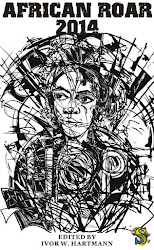Review: Black Diamond - Zakes Mda
 Black Diamond - Zakes Mda
Black Diamond - Zakes Mda
Reviewed by Ivor W. Hartmann, first published in wordsetc#7.
From start to finish, Black Diamond is a profound and often hilarious satirical rollercoaster ride around the heart of Johannesburg and the South African psyche. With this his eighth novel, Mda displays a warm mature confidence and he stands without a doubt as one of the master contemporary storytellers of our time.
Writing a novel can be a lonely pursuit but there is a definite sense that when Mda sits down to write he is never alone nor lonely. Each main character is deep and well rounded holding true to Mda’s philosophy of compassion being the key to understanding each character and writing about them. Like life, nothing is simply black and white in Black Diamond.
First we meet the seemingly sexually repressed and uptight magistrate Kristin Uys, on a crusade to rid Roodeport of the “scum of the earth”; that being anyone having anything to do with the sex trade. In Kristin’s court room are the Visagie brothers, Stevo a small time pimp and Shortie his accomplice. When Kristin has to dismiss their case through lack of evidence, she takes revenge on Stevo and puts him back in prison for contempt of court. This single action forms the backbone plot which drives Black Diamond, as Stevo then swears revenge on the magistrate.
Outside the courtroom we meet Ma Visagie and the brother’s ex-nursemaid Aunt Magda. They, along with a motley bunch one way or another indebted to the Visagie family, are protesting the Visagie’s imprisonment. It is this scene that sets the inverted stereotype as the continuing tone for the book, with white folk using classic anti-apartheid demonstration techniques. Though to paraphrase Adichie, a stereotype is just an incomplete story, and Mda strives to tell a whole story. For every character in Black Diamond has a very real place in today’s South Africa.
Enter Don Mateza, a cat-loving high level security guard and ex-freedom fighter AKA AK Bazooka, who fought for the liberation of SA from his early teens. But because he was successfully never imprisoned failed to enter what could be called The Robben Island Club, and thereby gain enough “Political Capital” to be converted to “Capital Capital” and become the book’s namesake, a Black Diamond. Not that this is what he really wants above all else but rather it is expected of him, especially from his girlfriend Tumi who is constantly pushing him towards this end.
Tumi’s oft played example, and indeed the shadow that hangs over all wannabe Black Diamonds, is the minor character of Molotov Mbungane. A man who likes to say “accumulation cannot be democratised comrades” and is the king pin of the Black Diamonds, the wealthiest beneficiary of BEE. With a few more liberally scattered references Mda make it easy to guess whom he might be.
From Soweto, Weltevreden Park, North Riding to Roodeport and Strijdom Park, Johannesburg itself is also very much a main character. Each location, like each character, is lovingly rendered as if they were Mda’s children and he has carefully watched them blossom. Though always tempered with a gentle humour there is a definite strong undercurrent of exposure inherent in Black Diamond, a willingness by Mda to expose all facets of Johannesburg and its denizens. He consummately describes a rapidly evolving city as indicative of the country, which has come out of the celebration of freedom and headlong into its practicalities, fuelled with an undeniable optimism and willingness to move forward and overcome any obstacle. Wordsetc is one of my favourite print literary magazines (available worldwide through subscription) and here's a bit about issue#7 from the publisher and editor Phakama Mbonambi:
Wordsetc is one of my favourite print literary magazines (available worldwide through subscription) and here's a bit about issue#7 from the publisher and editor Phakama Mbonambi:
The seventh edition of Wordsetc, South Africa’s foremost literary journal, has just reached the shelves! The publication continues to showcase the best of South African literature. This time around it focuses on crime fiction as a theme. Guest edited by author and editor Joanne Hichens the edition explores the ins and outs of the genre, the motivation of crime writers to write crime fiction, and takes a look too at real-life crime in our society.
Read all about Margie Orford’s success – how she makes crime pay - with her Clare Hart series, in the main profile by Sam Beckbessinger.
There are also illuminating essays by Joanne Hichens, Jassie Mackenzie, Sarah Lotz, Richard Kunzmann, Roger Smith, Helen Moffett, Andrew Brown, Justice Malala, Emma Chen, Thembelani Ngenelwa and Megan Voysey-Braig. It’s a feast of reading for those who can’t get enough of South African literature and South African writers providing, apart from great writing, food for thought.




























0 comments:
Post a Comment